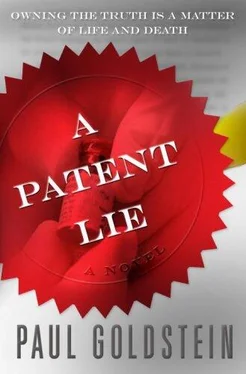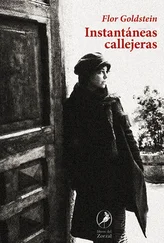Paul Goldstein - A Patent Lie
Здесь есть возможность читать онлайн «Paul Goldstein - A Patent Lie» весь текст электронной книги совершенно бесплатно (целиком полную версию без сокращений). В некоторых случаях можно слушать аудио, скачать через торрент в формате fb2 и присутствует краткое содержание. Жанр: Криминальный детектив, на английском языке. Описание произведения, (предисловие) а так же отзывы посетителей доступны на портале библиотеки ЛибКат.
- Название:A Patent Lie
- Автор:
- Жанр:
- Год:неизвестен
- ISBN:нет данных
- Рейтинг книги:3 / 5. Голосов: 1
-
Избранное:Добавить в избранное
- Отзывы:
-
Ваша оценка:
- 60
- 1
- 2
- 3
- 4
- 5
A Patent Lie: краткое содержание, описание и аннотация
Предлагаем к чтению аннотацию, описание, краткое содержание или предисловие (зависит от того, что написал сам автор книги «A Patent Lie»). Если вы не нашли необходимую информацию о книге — напишите в комментариях, мы постараемся отыскать её.
A Patent Lie — читать онлайн бесплатно полную книгу (весь текст) целиком
Ниже представлен текст книги, разбитый по страницам. Система сохранения места последней прочитанной страницы, позволяет с удобством читать онлайн бесплатно книгу «A Patent Lie», без необходимости каждый раз заново искать на чём Вы остановились. Поставьте закладку, и сможете в любой момент перейти на страницу, на которой закончили чтение.
Интервал:
Закладка:
Leonard said, “Do you ever think about the distance we've come? Leroy Avenue. St. Boniface. The Broadway Market with the old ladies in their babushkas. And here we are, talking about a drug that could save tens of millions of lives, two professional men, one who had a hand in creating it, the other who will be defending it in court.”
“The American dream,” Seeley said.
Leonard was almost invisible in the dark. When he rose, Seeley saw the reflection of firelight in his eyes. He came around to behind Seeley's chair. “You were what-fifteen? That's a long time ago.” As he spoke, Leonard kneaded his brother's shoulders with soft fingers. “If we're going to win,” Leonard said, “we need to be working as a team, everyone pulling in the same direction.”
Seeley wondered what else his brother and Barnum had forgotten to tell him. “Sure,” he said. “That would be helpful.”
FOUR
Seeley let down the window as he backed out of Leonard's driveway and the fragrance of eucalyptus again flooded into the car. Turning onto the main road back to the freeway, he thought about how careful Leonard had been with his money long before he haggled with caterers over wedding bills. Into a pickle jar in their bedroom closet he would deposit the coins and dollar bills that he collected from babysitting neighbors' children and making deliveries for the corner grocer. The squat barrel-shaped jar left the closet only when the little miser carried it to the grocer's to change coins for bills. So when, one night, Lenny offered Seeley every penny, the entire hoard, in return for his help, Seeley knew that his easily panicked brother had this time truly blundered into catastrophe.
It was late spring, Buffalo's most temperate season, and close to the end of the school year. Even in this sullen neighborhood of Poles, Litvaks, Ukrainians, and Germans, where resentments hung in the sooty haze like a premonition of bloodshed, neighbors called to each other from stoops and porches, and modest hopes stirred around the patchy, sprouting flower gardens. Seeley, freshly showered from baseball practice, was stretched out on his narrow bed, reading for a history final. Lenny was at his end of the card table that the boys used for a desk, fidgeting with a pencil and pretending at his math homework. In the half hour since Seeley came in Lenny did little more than trace the wood-grain pattern of the vinyl tabletop with a fingertip while a foot tap-danced ceaselessly below. Seeley was certain his brother was going to piss his pants.
It was the dinner hour, as their mother called it, even though the hour itself usually stretched past six o'clock to eight or nine or even later. The rule, cast in iron, was that no one in the Seeley house-hold sat down to dinner before Leonard Seeley Sr. returned from the Germania Social Club to take his place at the head of the kitchen table. Seeley's father had for years worked on the assembly line at the Chevrolet plant, but, with the plant's closing, the after-work detours to the Germania grew longer, filled with complaints to anyone who would listen that the new job, assembling windshield-wiper arms at the Trico plant, was depleting his soul. The Germania was in truth little more than a bar with stuffed stag heads and the heraldry of several German provinces on the wall, and on those rare evenings when her own boiling resentments had sufficiently stoked Mrs. Seeley's courage-a church group meeting might have required that the family eat at a normal hour-she would send Mike to the Germania to collect his father. The stale reek of smoke and beer permeated Seeley's memories of those trips, memories painted in the varnished yellow light of the place.
Once, when Seeley was eleven or twelve and searching through his parents' bureau and closet shelves for some key to the secrets that enshrouded the small, dark house, he found in a compartment of the carved box on top of his father's dresser a stamped brass key, the kind that might open a suitcase or a trunk, and a worn envelope with a translucent plastic sleeve the size of a postcard inside. The stained sleeve contained what Seeley took to be an identity card or visa. It bore the photograph of a man in his twenties-from the steep jaw and violent eyes, it was unmistakably his father-and the name Lothar Seelig.
That mystery lasted until, exhausted by her sons' pestering, their mother explained that, when he arrived in the United States in 1951, Lothar Seelig had changed his name to Leonard Seeley to escape the vilification of Germans that persisted even after the end of the war; indeed, during the war her own family had sloughed off the name Huber to become the Hubbells. The explanation only complicated Seeley's sense of his father's depravity. Even on his finest days, pitching a shutout or topping the school record for completed passes, Seeley's awareness of himself was that he was the son not of one but of two madmen. Alone in their room, he and Lenny entertained each other by walking about like cartoon monsters, legs goose-stepping, arms straight out and frozen into sticks, abjuring the other to beware, I am Lo thar! I vill seize you and destroy you!
Beneath the card table, both of Lenny's feet tapped wildly.
“For God's sake, Lenny, go to the bathroom if you have to pee.”
“You've got to help me, Mike.” The boy's lips trembled. “I'll give you all the money in my jar. You have to get rid of this for me.”
It was past eight o'clock and the aroma of roasting meat loaf had long since faded. Their mother had by now settled in the parlor and was knitting or mending or on the telephone with one of her church friends. In the empty kitchen, the television played at top volume; on the evidence of the laugh track, it was tuned to a sitcom. In Seeley's memory, the television, though rarely watched, was always on. It could have been a fifth member of the family and the only one to be counted on for laughter.
From under the card table, Lenny brought out a package and pushed it toward his brother. When Seeley only looked at it, Lenny, his voice breaking, said, “Take it, Mike. You have to get rid of it.”
The bag, an ordinary lunch sack creased and stained from his brother's handling, was tightly wrapped around the object inside, and the moment Seeley lifted the package, he knew from its heft what it was.
“Does he know you took it?”
Lenny shook his head.
“Put it back before he gets home.”
“I can't.” Beads of moisture had formed on his brother's upper lip. He nodded at the bag. His voice pleaded. “Open it.”
Seeley emptied the bag onto his bed. In the bright light of the room, the chrome barrel glowed. The gun was intact and the cartridges, which Lenny had emptied from the cylinder, were all there. Then Seeley saw why Lenny couldn't return the revolver to their father's dresser. The barrel was scarred and abraded as if it had been smashed repeatedly with a rock. Black shards of some hard material clung to the cartridges. Seeley looked at the gun's grip. Lenny's efforts with the rock had shattered the cast black rubber. The larger pieces he had reattached with rubber bands and what looked like library paste.
“What were you trying to do?”
His brother emerged from the closet with the half-full pickle jar. “I wanted to break it and throw it down the sewer.”
“Why didn't you?”
“I was afraid. Take the money, Mike! You have to help me.”
“I don't want the money.”
“You have to get rid of it!”
It seemed to Seeley that he had shielded his brother since before Lenny learned to walk. A table lamp shattered on the floor; grape juice splashed from a glass onto a lace curtain. It was easier for Seeley to absorb the blame than to have to listen to his brother suffer a beating. The logic that the role of the strong was to protect the weak was too ingrained for him to do anything else.
Читать дальшеИнтервал:
Закладка:
Похожие книги на «A Patent Lie»
Представляем Вашему вниманию похожие книги на «A Patent Lie» списком для выбора. Мы отобрали схожую по названию и смыслу литературу в надежде предоставить читателям больше вариантов отыскать новые, интересные, ещё непрочитанные произведения.
Обсуждение, отзывы о книге «A Patent Lie» и просто собственные мнения читателей. Оставьте ваши комментарии, напишите, что Вы думаете о произведении, его смысле или главных героях. Укажите что конкретно понравилось, а что нет, и почему Вы так считаете.












